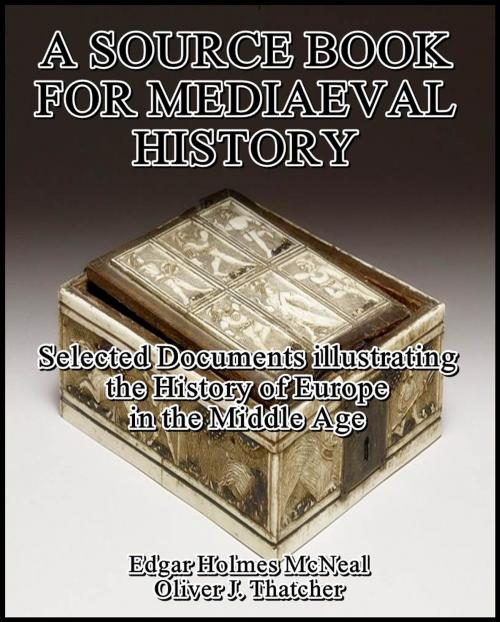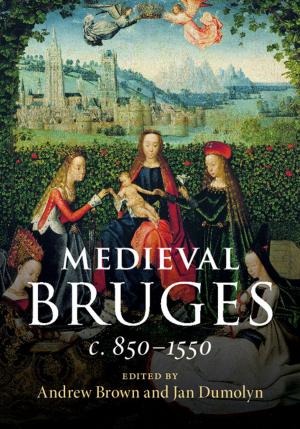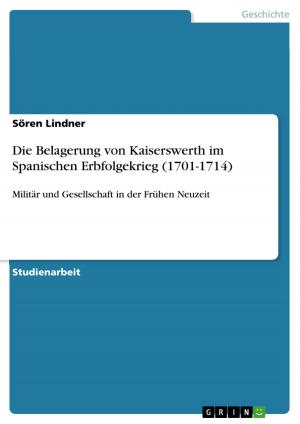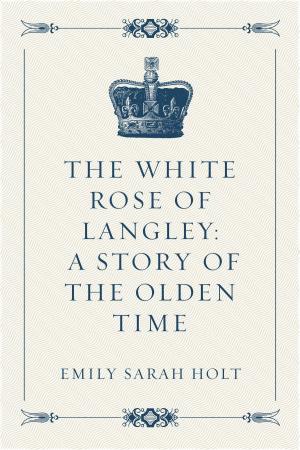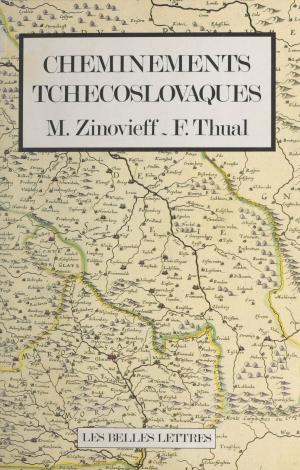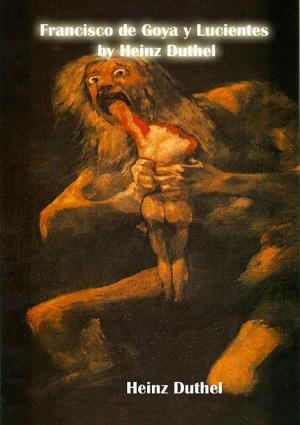A Source Book for Mediaeval History : Selected Documents illustrating the History of Europe in the Middle Age
Nonfiction, History, Medieval, Germany, European General| Author: | Oliver J. Thatcher, Edgar Holmes McNeal | ISBN: | 1230000225371 |
| Publisher: | CHARLES SCRIBNER’S SONS | Publication: | March 15, 2014 |
| Imprint: | Language: | English |
| Author: | Oliver J. Thatcher, Edgar Holmes McNeal |
| ISBN: | 1230000225371 |
| Publisher: | CHARLES SCRIBNER’S SONS |
| Publication: | March 15, 2014 |
| Imprint: | |
| Language: | English |
A Source Book for Mediaeval History : Selected Documents illustrating the History of Europe in the Middle Age
It will be observed that we have made use chiefly of documents, quoting from chronicles only when it seemed absolutely necessary. An exception to this general principle is found in section I, where a larger use of chronicles was rendered necessary by the lack of documentary sources for much of the period covered; but it is perhaps unnecessary to apologize for presenting selections from the important histories of Tacitus, Gregory, Einhard, and Widukind. In the matter of form (translation, omissions, arrangements, notes, etc.), we were guided by considerations of the purpose of the book. The style of most of the documents in the original is involved, obscure, bombastic, and repetitious. A faithful rendition into English would often be quite unintelligible. We have endeavored to make a clear and readable translation, but always to give the correct meaning. If we have failed in the latter it is not for want of constant effort. We have not hesitated to omit phrases and clauses, often of a parenthetical nature, the presence of which in the translation would only render the passage obscure and obstruct the thought. As a rule we have given the full text of the body of the document, but we have generally omitted the first and last paragraphs, the former containing usually titles and pious generalities, and the latter being composed of lists of witnesses, etc. We have given a sufficient number of the documents in full to illustrate these features of mediæval diplomatics. All but the most trivial omissions in the text (which are matters rather of form of translation) are indicated thus: ... Insertions in the text to explain the meaning of phrases are inclosed in brackets [ ]. Quotations from the Bible are regularly given in the words of the Authorized Version, but where the Latin (taken from the Vulgate) differs in any essential manner, we have sometimes translated the passage literally.
Within each section the documents are arranged in chronological order, except in a few cases where the topical arrangement seemed necessary. We believe that the explanatory notes in the form of introductions and foot-notes will be found of service; they are by no means exhaustive, but are intended to explain the setting and importance of the document and the difficult or obscure passages it may contain. The reference to the work or the collection in which the original is found is given after the title of practically every document; the meaning of the references will be plain from the accompanying bibliography. The original of nearly all the documents is in Latin; some few are in Greek, Old French, or German, and in such cases the language of the original is indicated.
It is impossible, of course, to give explicit directions as to the use of the book, other than the very obvious methods of requiring the student to read and analyze the documents assigned in connection with the lesson in the text-book, and of making clear to him the relation of the document to the event. It may be possible also for the teacher to give the student some notion of the meaning of "historical method"; e.g., the necessity of making allowance for the ignorance or the bias of the author in chronicles, or the way in which a knowledge of institutions is deduced from incidental references in documents. Suggestions of both sorts will be found in the introduction and notes. The teacher should insist on the use of such helps as are found in the book: notes, cross-references, glossary, etc. Groups of documents can be used to advantage in topical work: assigned topics worked up from authorities can be illustrated by documents selected from the book; e.g., imperial elections, papal elections, the Normans in Sicily, history of the Austrian dominions, Germans and Slavs on the eastern frontier, relations of the emperors and the popes before the investiture strife, etc.
A Source Book for Mediaeval History : Selected Documents illustrating the History of Europe in the Middle Age
It will be observed that we have made use chiefly of documents, quoting from chronicles only when it seemed absolutely necessary. An exception to this general principle is found in section I, where a larger use of chronicles was rendered necessary by the lack of documentary sources for much of the period covered; but it is perhaps unnecessary to apologize for presenting selections from the important histories of Tacitus, Gregory, Einhard, and Widukind. In the matter of form (translation, omissions, arrangements, notes, etc.), we were guided by considerations of the purpose of the book. The style of most of the documents in the original is involved, obscure, bombastic, and repetitious. A faithful rendition into English would often be quite unintelligible. We have endeavored to make a clear and readable translation, but always to give the correct meaning. If we have failed in the latter it is not for want of constant effort. We have not hesitated to omit phrases and clauses, often of a parenthetical nature, the presence of which in the translation would only render the passage obscure and obstruct the thought. As a rule we have given the full text of the body of the document, but we have generally omitted the first and last paragraphs, the former containing usually titles and pious generalities, and the latter being composed of lists of witnesses, etc. We have given a sufficient number of the documents in full to illustrate these features of mediæval diplomatics. All but the most trivial omissions in the text (which are matters rather of form of translation) are indicated thus: ... Insertions in the text to explain the meaning of phrases are inclosed in brackets [ ]. Quotations from the Bible are regularly given in the words of the Authorized Version, but where the Latin (taken from the Vulgate) differs in any essential manner, we have sometimes translated the passage literally.
Within each section the documents are arranged in chronological order, except in a few cases where the topical arrangement seemed necessary. We believe that the explanatory notes in the form of introductions and foot-notes will be found of service; they are by no means exhaustive, but are intended to explain the setting and importance of the document and the difficult or obscure passages it may contain. The reference to the work or the collection in which the original is found is given after the title of practically every document; the meaning of the references will be plain from the accompanying bibliography. The original of nearly all the documents is in Latin; some few are in Greek, Old French, or German, and in such cases the language of the original is indicated.
It is impossible, of course, to give explicit directions as to the use of the book, other than the very obvious methods of requiring the student to read and analyze the documents assigned in connection with the lesson in the text-book, and of making clear to him the relation of the document to the event. It may be possible also for the teacher to give the student some notion of the meaning of "historical method"; e.g., the necessity of making allowance for the ignorance or the bias of the author in chronicles, or the way in which a knowledge of institutions is deduced from incidental references in documents. Suggestions of both sorts will be found in the introduction and notes. The teacher should insist on the use of such helps as are found in the book: notes, cross-references, glossary, etc. Groups of documents can be used to advantage in topical work: assigned topics worked up from authorities can be illustrated by documents selected from the book; e.g., imperial elections, papal elections, the Normans in Sicily, history of the Austrian dominions, Germans and Slavs on the eastern frontier, relations of the emperors and the popes before the investiture strife, etc.
